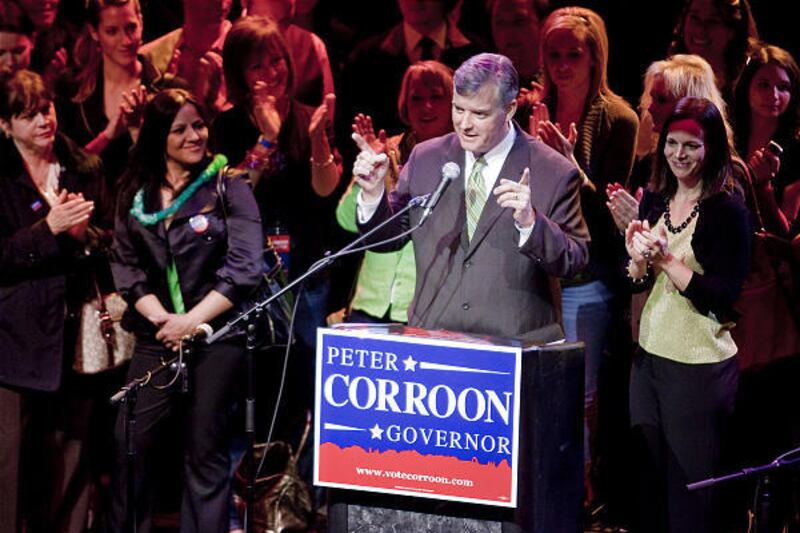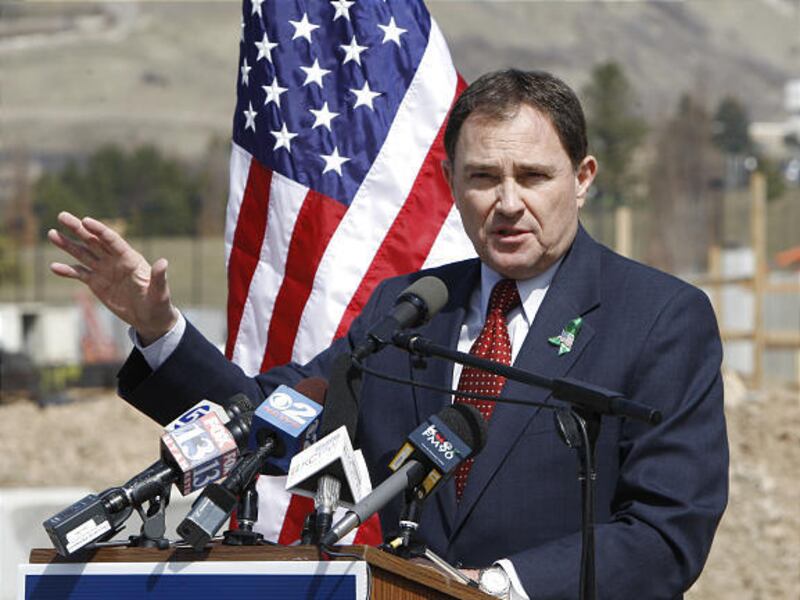SALT LAKE CITY — Utah's gubernatorial hopefuls, Democratic Salt Lake County Mayor Peter Corroon and Republican Gov. Gary Herbert, were in full agreement on one issue on Wednesday — St. Patrick's Day was the right time to officially launch their pursuits of the state's top executive post.
Their approaches to firing up their prospective campaign machines, however, were decidedly different.
While Herbert split his announcement into two relatively low-key appearances in Salt Lake — at the University of Utah and his downtown campaign headquarters — Corroon squeezed in stops in St. George, Ogden, Park City and Salt Lake City. Corroon's end of day rally at a restaurant in The Gateway drew more than 1,000 attendees.
Both men had already unofficially thrown their hats in the ring for the 2010 race — a special mid-term opportunity brought about by former Gov. Jon Huntsman, Jr.'s early departure from office to serve as the U.S. ambassador to China. Now Corroon, serving his second stint at the helm of the state's largest county, and Herbert, Huntsman's one-time lieutenant governor and former Utah County commissioner, will need to overcome name recognition challenges outside the Wasatch Front in addition to crafting messages that resonate with Utah voters.
At his Salt Lake campaign headquarters, Herbert touted his successes in the just-completed legislative session, including managing to get his December budget proposal — one that found balance without tax increases or debilitating cuts — through the legislative process relatively intact. Lawmakers did approve a tobacco tax increase, but otherwise the governor's promises, including holding public and higher education harmless, finding efficiencies in lieu of cuts and moving another set of state-based health care reforms through, held up in the end.
Herbert promised to fight for state powers guaranteed under the 10th Amendment — a theme taken up by legislators this year in some two dozen proposals.
"Big Brother has gotten too big in Washington and governors have got to start pushing back," Herbert said. "This revolution is going to be led by governors, Democrats and Republicans, and I'm trying to lead the charge in the National Governor's Association and the Western Governor's Association."
Herbert said the "one-size-fits-all approach taken by Washington" doesn't work, and pledged to put the state in the forefront of reclaiming the power to formulate "Utah solutions to Utah problems."
Corroon told his supporters Wednesday that it was time for the state to get back to basics and promised to focus on education, bringing jobs back to the state and working toward a system of energy independence. He also made note of his support of Utah's sovereignty, but said his approach would likely differ from the one taken by the Legislature this session.
"I think we need to make the federal government a partner in problem solving," Corroon said. "Spending millions to fight the federal government doesn't help Utah."
Corroon also said that a history of cuts to public and higher education funding was not serving Utah well.
"For decades, our elected officials have claimed that education is their number one priority," Corroon said. "But over the last few years, hundreds of millions of dollars have been removed from Utah's general budget."
Corroon also bemoaned the Legislature's decision this year to forego campaign spending limits in lieu of new reporting requirements, a position supported by Herbert.
"Citizens want to get money out of politics," Corroon said. "Campaign finance reform would go a long way to rekindling the trust of Utahns."
While each candidate starts the work to make their name a household term outside the I-15 corridor, Corroon likely is facing the steeper mountain to climb in a state that hasn't voted for a Democratic governor since Scott Matheson won a second term in 1980.
e-mail: araymond@desnews.com


